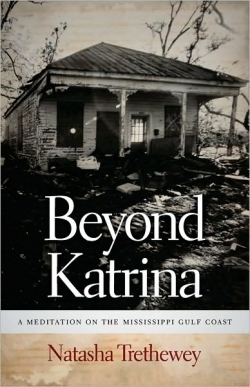
Beyond Katrina
A Meditation on the Mississippi Gulf Coast
“This is a love letter to the Gulf Coast,” Natasha Trethewey writes in “Liturgy,” one of the many excellent poems interspersed through the prose of Beyond Katrina, “a praise, a song, a dirge, invocation and benediction, a requiem for the Gulf Coast.” In her book, Trethewey tells the story of Gulfport, the second largest city in Mississippi, weaving together history, local lore, and personal tragedy to create a book that is equal parts lament and exultation for the people and places of her home.
Early in Beyond Katrina, Trethewey recounts an exchange with her grandmother who, in the days after Katrina, confused the new hurricane with Hurricane Camille. “Between the two,” Trethewey writes, “there is the suggestion of both a narrative and a metanarrative—the way she both remembers and forgets, the erasures, and how intricately intertwined memory and forgetting always are.” Chapter by chapter, Tretheway dispels the common Katrina narrative, replacing it with the story she, as a resident of the Gulf Coast, knows. She tells of the off-shore gambling industry that had begun to provide jobs, money, and stability for the residents before the hurricane hit. She recounts the missteps of a baffling relief effort that abandoned those who needed help the most, and tells of houses where the chalk numbers counting the dead inside still adorn the doors, and whose “For Sale” signs have long ago been traded for “Condemned.”
Trethewey also adds her own counter-narrative, using her family’s history to chronicle Gulfport’s rise, and the story of her brother’s heartbreaking descent from successful contractor to recovery worker to unemployed and in debt to a small-time drug carrier, and finally to prisoner, to illustrate a much larger fall.
The author is concerned with cultural narratives, and with how new narratives are shaped when our own experiences and memories are added to events larger than ourselves. In a sad irony, yet another narrative now underscores Beyond Katrina, added in the time between writing and publication. In the same way Trethewey’s poems written prior to Katrina have taken on additional meaning, her entire book is now invested with an even higher sense of tragedy. The initials “B.P.” and phrases like “Oil spill” and “Deep-Sea Drilling” haunt the reader on every page, layered over Trethewey’s own narrative. Already, the Gulf Coast is under another attack, while still suffering from a tragedy that has not yet ended; already the strength Trethewey writes of, stretched to the breaking point, is being called upon again.
Reviewed by
Michael Beeman
Disclosure: This article is not an endorsement, but a review. The publisher of this book provided free copies of the book to have their book reviewed by a professional reviewer. No fee was paid by the publisher for this review. Foreword Reviews only recommends books that we love. Foreword Magazine, Inc. is disclosing this in accordance with the Federal Trade Commission’s 16 CFR, Part 255.
